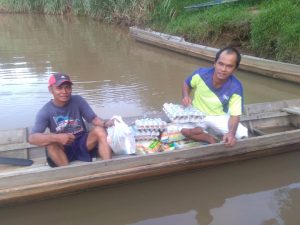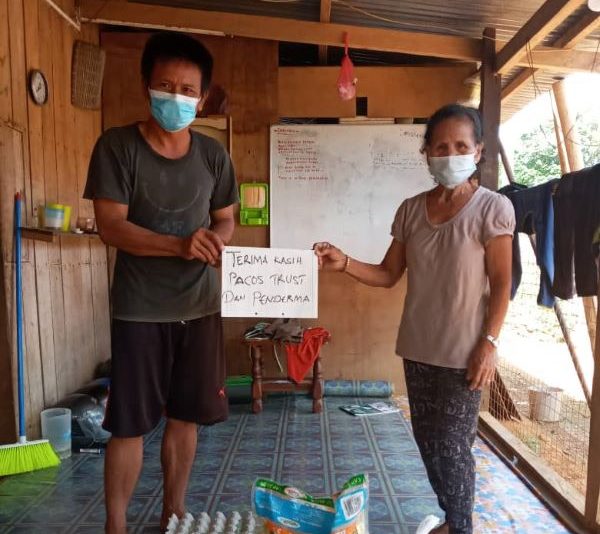First published on 06/20/2020, and last updated on 07/08/2020
By Anne Lasimbang, Executive Director of PACOS Trust (ICCA Consortium Member).
The emergence of the COVID-19 pandemic has brought unprecedented health, economic, and social challenges to communities around the world. It has severely and disproportionately affected vulnerable groups such as the urban and rural poor, Indigenous peoples, women, persons with disabilities, and refugees. In one country after another, this terrible virus has overwhelmed us with its fast moving, destructive power.
PACOS Trust is an organization dedicated to working with indigenous communities in Sabah, Malaysia. When the pandemic hit, we at PACOS faced the urgent task of developing strategies in response. We came up with a two-part action plan, detailed below.
PACOS Response during Malaysia’s Lockdown (18th March 2020 – June 2020)
Developing community mechanisms for Indigenous peoples to identify, analyse, and respond to needs during the restricted movement period, and to monitor related concerns during the COVID-19 pandemic.
To address the challenges of communication among our widespread communities, PACOS created a central hub for information exchange among all the groups in our network. The social messaging application, WhatsApp, would serve as our primary tool, as it was already in widespread use among community organisers.
Many of our communities have weak cellphone coverage due to their locations. Contact persons in communities daily will go to the only places where they have cellphone coverage to download messages and send reports back to the larger group. Several PACOS staff will monitor the WhatsApp groups and compile the reports forwarded by communities to provide current information about the communities and their needs. For those communities located deep in the interior and unable to communicate via WhatsApp, the community organisers with WhatsApp coverage who are closest to their locations will be responsible for staying in touch and reporting to the WhatsApp group on their behalf.
From the data received to date, PACOS has registered a total of 12,229 families from 205 villages in need of relief. With that information in hand, we moved quickly into fundraising. As donations came in, we were able to provide dry foods, a most urgent crisis intervention for our communities. During the lockdown, PACOS coordinated with the nearest community capable of supplying packages of dry food. PACOS pays the suppliers through online payment systems, and when the packages are ready, our community leaders organise the collection and delivery. Community leaders ensure that the aid is distributed to those in need, and they report back to PACOS when the distribution has been accomplished.
This relief work will continue until the lockdown/Movement Control Order (MCO) has been lifted by the government.
In addition to relief aid, PACOS helps disseminate information about COVID-19
The sudden arrival of the pandemic in Sabah found many communities especially vulnerable. As inaccurate information spread, and practical information was lacking, great fear and confusion swept into the lives of our communities. With its established community network, PACOS was well positioned to pass along the information about COVID-19 provided by the Health Ministry; especially the measures they could take to avoid contracting and spreading the virus.

© PACOS Trust.
PACOS Response after the lifting of the lockdown – post movement control order (July-December 2020): Which pro-active recovery interventions will be most effective in the post-pandemic context of community life and needs; which strategies will be most productive?
In the second phase, our work is to address the impacts of the crisis, and to help communities recover and become stronger and more resilient. Possible immediate to short-term responses:
1. Address food security
It is imperative that we address the increasing food insecurity amongst Indigenous communities and work to overcome the fear of having “no food on the table” during times of crisis. For PACOS, family food security is part and parcel of economic recovery, based on the principle of “Money Saved Is Money Earned”. We work to ensure that the money earned by families in their various income-generating activities will be used for education and health, or for essentials the family cannot produce itself. PACOS can support the agricultural production that improves food security. This is already a strong focus for PACOS in its ongoing projects in agroecology, agroforestry, agrobiodiversity and urban gardening. Through community learning centres, we can provide information on healthy eating and other ways of strengthening immunity for the communities.
2. Economic recovery
The health crisis of this pandemic has quickly spilled over into an economic crisis. Many Indigenous communities who were part of the supply chain, selling at weekend markets, have lost their livelihoods. Many will slip further into poverty. We need to support income-generating activities that are based on sustainable use of natural resources for food production, crafts and making farming equipment. PACOS can also support the formation of community supply chains and marketing networks, and we can help in the formation and strengthening of cooperatives among indigenous communities.
3. Increase capacity of Indigenous communities to respond more effectively to the needs during restricted movement periods related to disasters/pandemics
4. Continue the work of information dissemination about how the virus is spread and effective ways to contain it
5. Strengthen conservation initiatives among Indigenous communities (medium to long-term action)
The pandemic has heightened peoples’ awareness of the vital relationship between pandemics and the health of the environment. There is an urgent need to support conservation initiatives that will safeguard the indigenous and community conserved areas (ICCAs) associated with water sources and secure water supplies, as well as their role as sources of food and medicine.
PACOS will encourage its communities in Moyog to work with the ‘1 Million Seedlings Project’ initiated by their elected representative. Some of these seedlings can then be planted in ICCAs, especially in sensitive areas such as riverbanks, riparian reserves and water catchments.
Featured image: © PACOS Trust.
